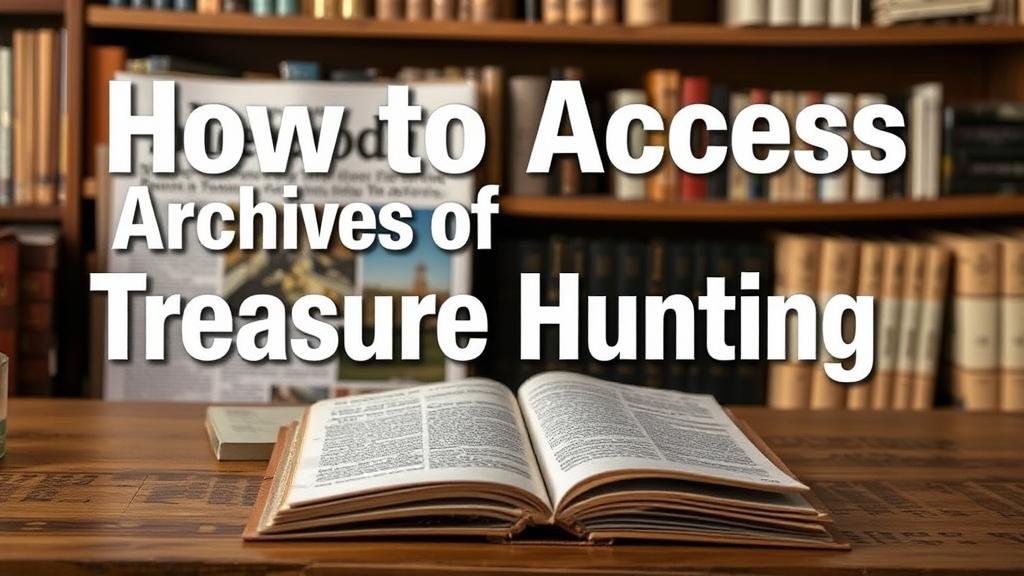How to Access Archives of Treasure Hunting Magazines for Research
How to Access Archives of Treasure Hunting Magazines for Research
Treasure hunting, a pursuit that combines adventure and history, has resulted in a plethora of literature over the decades. For researchers, accessing archives of treasure hunting magazines can be an invaluable resource for understanding trends, methodologies, and personal narratives within this niche. This article provides a systematic approach to accessing these archives, utilizing both traditional and digital resources.
Understanding the Importance of Treasure Hunting Magazines
Treasure hunting magazines serve as primary sources that document the evolution of treasure hunting activities, popular theories, and technological advancements in retrieval methods. offer insights into the mindset of treasure hunters and reflect societal interests at different points in history. For example, magazines like Treasure and Seeking Treasure have featured content on significant finds, such as the discovery of the Spanish galleon Atocha in 1985, which was valued at over $400 million in gold and silver.
Identifying Relevant Magazines
Before diving into archival research, it is critical to identify magazines that have historically published content on treasure hunting. Some prominent titles include:
- Treasure (1970-present)
- Lost Treasure (1968-present)
- American Digger (2003-present)
These publications have cataloged numerous stories and case studies, making them essential for comprehensive research.
Accessing Physical Archives
Many university libraries and local historical societies maintain physical archives of magazines. Here are steps to access these physical archives:
- Identify Institutions: Start with academic libraries, public libraries, or local historical societies. Institutions with a focus on archaeology or local history may have dedicated collections.
- Use Online Catalogs: Leverage online library catalogs or WorldCat to locate specific magazines. Search using keywords related to treasure hunting.
- Visit In-Person: Plan a visit to the selected institutions to access the physical archives. Some may require appointments or have restrictions due to preservation efforts.
Exploring Digital Archives
With the digitization of many historical documents, online resources have become essential for accessing treasure hunting magazines. The following digital repositories are particularly useful:
- Google Books: Offers a significant collection of digitized magazines and books. Search for specific titles or topics related to treasure hunting.
- Archive.org: A nonprofit digital library that provides extensive archives of various publications. Users can conduct keyword searches to find specific magazine issues.
- JSTOR: While primarily a database for academic journals, JSTOR occasionally has access to periodicals related to archaeology and history.
These digital platforms allow researchers to efficiently access and analyze a wide range of materials without geographical limitations.
Utilizing Subscription Services
Many treasure hunting magazines also offer digital subscriptions that provide access to current issues and archives. Subscribe to platforms like:
- Lost Treasure Magazine – Provides an extensive archive of past issues for subscribers.
- Treasure Magazine – Offers a digital format which includes past articles and research topics.
These subscriptions often include exclusive content that can greatly enhance research findings.
Cataloging Your Findings
As you gather materials, it is crucial to catalog your findings adequately. Keeping detailed records of cited articles, publication dates, and page numbers will facilitate future research and strengthen your bibliography. Consider using reference management tools such as Zotero or EndNote to organize your materials efficiently.
Real-World Applications of Research Findings
The information obtained from these archives can be utilized in various ways. For example:
- Academic Research: Scholars may publish articles or papers analyzing treasure hunting trends over time, helping to identify how socio-political factors influence this field.
- Public Engagement: Authors can write books or blogs that share historical insights on treasure hunting, thus piquing public interest.
Conclusion
Accessing archives of treasure hunting magazines requires a structured approach, utilizing both physical and digital resources. By leveraging libraries, online repositories, and subscription services, researchers can unlock a wealth of information to enrich their understanding of this adventurous field. Careful documentation of findings not only enhances academic rigor but also supports broader discussions around the historical significance of treasure hunting.
Through dedicated research, scholars and enthusiasts alike can contribute meaningful narratives that honor the legacy of treasure hunting and its impact on our understanding of history.



